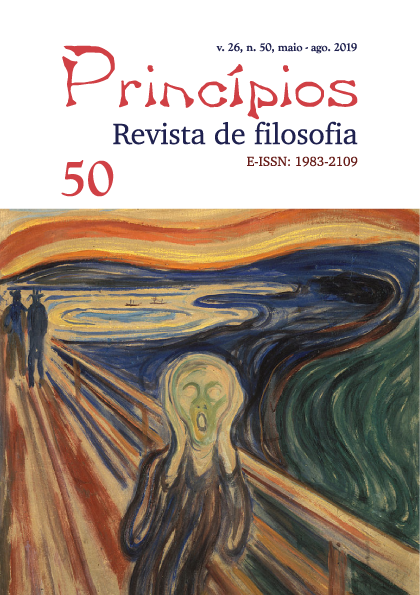Má consciência e mal-estar civilizacional, do niilismo a um mundo possível
Considerações a partir de Segunda Dissertação de Para a Genealogia da Moral
DOI:
https://doi.org/10.21680/1983-2109.2019v26n50ID17081Palavras-chave:
Nietzsche, má consciência, cultura, moral, civilizaçãoResumo
A má consciência é produzida por uma civilização niilista.
Na Segunda Dissertação da Para a genealogia da moral Nietzsche detecta
que o problema da consciência é, antes de tudo, um problema
cultural e não individual. A perda da ênfase sobre o indivíduo, na
massa uniforme da coletividade, conduz ao abandono dos traços que
marcam a grandeza potencial da ação. Sem o traço individual equivale
a entrega ao conformismo moral gregário, a direção de degenerescência
da consciência. Neste sentido, a má consciência se revela como
problema oriundo de uma civilização enferma, niilista; sua superação
aponta para um mundo possível.
Downloads
Downloads
Publicado
Como Citar
Edição
Seção
Licença
Autores mantêm os direitos autorais e concedem à revista o direito de primeira publicação, com o trabalho simultaneamente licenciado sob a Licença Creative Commons Attribution que permite o compartilhamento do trabalho com reconhecimento da autoria e publicação inicial nesta revista.
Termos da licença:
| Não Comercial (NC) | Os licenciados podem copiar, distribuir, exibir e executar a obra e fazer trabalhos derivados dela, desde que sejam para fins não comerciais. |
| Compartilha Igual (SA) | Os licenciados devem distribuir obras derivadas somente sob uma licença idêntica à que governa a obra original ou menos restritiva. |


 Português (Brasil)
Português (Brasil) English
English Español (España)
Español (España) Français (Canada)
Français (Canada)


